5TH SYMPOSIUM
OF THE ELISABETH KÄSEMANN FOUNDATION, CATHOLIC UNIVERSITY OF EICHSTÄTT-INGOLSTADT JUNE 2022
COOPERATION PARTNER
Colonia Dignidad – a German-Chilean History from the Perspective of Science, Legal Processing and Public Staging
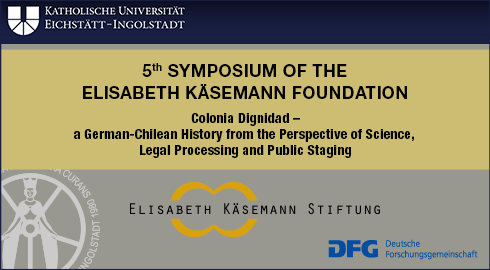
The Center for Latin American Studies (ZILAS) and the Elisabeth Käsemann Foundation organized a symposium at the Catholic University of Eichstätt-Ingolstadt from 22 to 24 June 2022 entitled “Colonia Dignidad – a German-Chilean history from the perspective of science, legal processing and public staging”.
The “Sociedad Benefactora y Educacional Dignidad” (Charitable and Educational Society ‘Dignity’) was founded in 1961 by German sect leader Paul Schäfer and his followers. The organization, also known as Colonia Dignidad, staged and represented itself to the outside world as a work-centered and socially oriented community that was supposedly deeply rooted in early Christian values and ideals. In reality, however, it was an instrument used to commit crimes against humanity for decades.
WELCOME
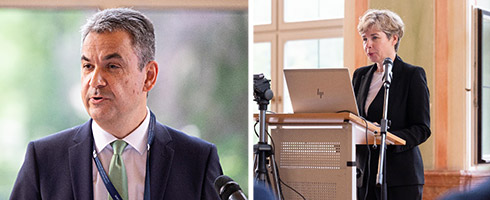
The VICE PRESIDENT OF THE CATHOLIC UNIVERSITY OF EICHSTÄTT-INGOLSTADT, KLAUS STÜWE, PhD warmly welcomed the guests.
DOROTHEE WEITBRECHT, PhD, MANAGING DIRECTOR OF THE ELISABETH KÄSEMANN FOUNDATION
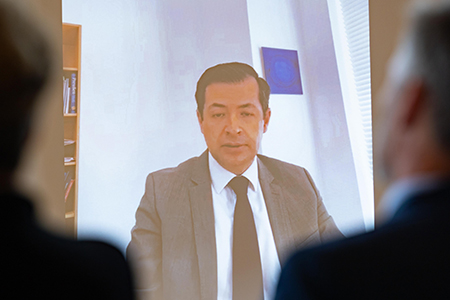
FRANCISCO ULLOA CHARGÈ D’AFFAIRES of the embassy of the republic of Chile in Germany, gave an overview of German-Chilean cooperation in connection with theColonia Dignidad in his welcome address.
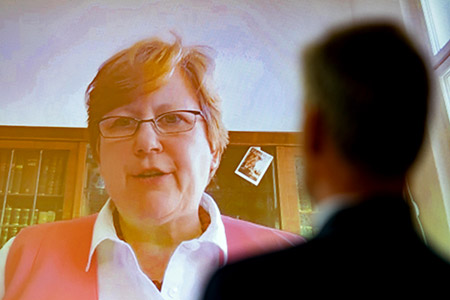
BEATE RUDOLF, PhD, DIRECTOR OF THE GERMAN INSTITUTE FOR HUMAN RIGHTS, dedicated her opening lecture to the topic: “Dealing with Colonia Dignidad from a Human Rights Perspective”.
PANEL I
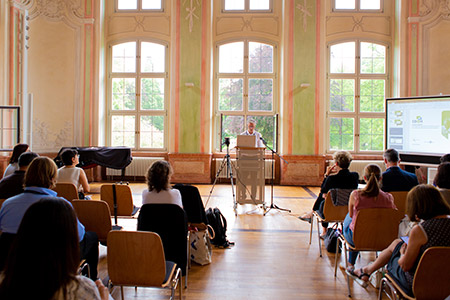
PROF. THOMAS FISCHER, PhD, DIRECTOR OF THE CENTER FOR LATIN AMERICAN STUDIES (ZILAS) and CHAIRMAN OF THE BOARD OF TRUSTEES OF THE ELISABETH KÄSEMANN FOUNDATION opened the first panel “State of the Art: the evolution of the political and historical debate on the ‘Colonia Dignidad‘, its significance and perception, its impact and legacy in Germany and Chile after 1990″.
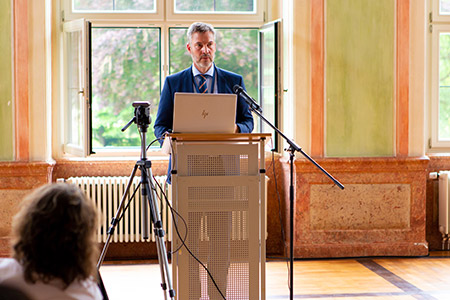
ENRICO BRANDT GERMAN FEDERAL FOREIGN OFFICE, HEAD OF DIVISION FOR REGIONAL POLICY AFFAIRS FOR LATIN AMERICA AND THE CARRIBEAN & BILATERAL RELATIONS WITH CONO SUR COUNTRIES AND BRAZIL
The Federal Foreign Office, which is a member of the Joint Commission of the German Bundestag and the Federal Government to deal with the crimes of Colonia Dignidad, was represented at the symposium by Enrico Brandt. He retrospectively called the speech of the then Federal Foreign Minister Steinmeier in 2016 a “turning point” in the assessment of the historical role of German diplomacy in connection with the Colonia Dignidad. This reassessment does not result in a legal obligation but in a moral obligation. Since then, the Federal Foreign Office has given the issue new priority and is working on various initiatives to deal with the past. For the Federal Foreign Office, the focus is on implementing the aid concept for the victims of Colonia Dignidad developed in the Joint Commission. It is also funding, among other things, the Freie Universität Berlin project “Colonia Dignidad. A Chilean-German Oral History Archive” and, together with the Chilean government, is involved in the German-Chilean Mixed Commission for coming to terms with Colonia Dignidad and integrating the victims into society. The diverse approaches of the initiatives will reach far into the future. In view of the criticism of the protracted implementation of the aid concept, Brandt emphasized its novelty. The goal remains to help those affected quickly and unbureaucratically.
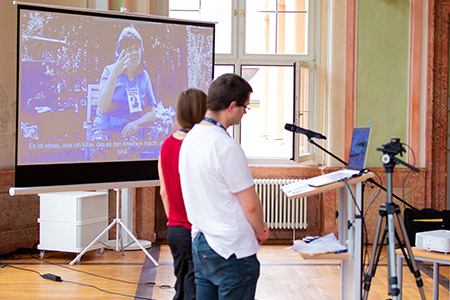
PHILIPP KANDLER, PhD AND DOROTHEE WEIN HISTORIKER UND ANTHROPOLOGIN, FREIE UNIVERSITÄT BERLIN
In their contribution, Philipp Kandler and Dorothee Wein presented the project conducted at the Freie Universität Berlin under the direction of Stefan Rinke, PhD, “Colonia Dignidad. A Chilean-German Oral History Archive”. A total of 64 biographical interviews were conducted with former members of Colonia Dignidad, former political prisoners, relatives of disappeared prisoners, Chileans who were sexually abused by Paul Schäfer in their youth and other people who were affected by and involved in the events in the Colonia Dignidad. The interviews in German or Spanish were transcribed, translated and scientifically processed. This resulted in a multifaceted interview archive from different perspectives, which aims to promote scientific research on the topic via an online platform with protected access and is intended for the purposes of political education. The goal of the interview project was not just to collect accounts of the crimes committed in the former Colonia Dignidad. Moreover, the project aimed to adequately portray the very different groups that were and still are associated with Colonia Dignidad. The project of the Freie Universität Berlin was funded by the German Foreign Office between 2019 and 2022 on the basis of a resolution of the German Bundestag.
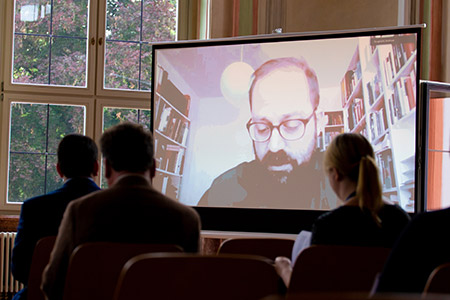
ANDREAS SCHÜLLER HEAD OF THE INTERNATIONAL CRIMES AND LEGAL RESPONSIBILITY PROGRAM AT THE EUROPEAN CENTER FOR CONSTITUTIONAL AND HUMAN RIGHTS E. V. (ECCHR)
The failure of the German justice system to prosecute the perpetrators of Colonia Dignidad was the focus of Andreas Schüller’s presentation. Using the example of Hartmut Hopp, who was convicted in Chile for his crimes committed in Colonia Dignidad and who managed to escape from Chile to Germany in 2011, he described the inadequacies of German criminal law in the face of systemic torture and forced disappearances. The crimes committed in Colonia Dignidad were not covered by the criminal code or subject to the statute of limitations. In addition, other factors had caused the closing of several investigations, such as failure to question witnesses, insufficient knowledge of the Colonia Dignidad system that stood in the way of effective questioning of witnesses, and a lack of understanding of the structure of tyranny in the sect that misjudged the individual responsibility of perpetrators. The only proceedings still pending in Germany in this case, he said, were the complaint filed with the Ministry of Justice of the state of North Rhine-Westphalia against the public prosecutor’s office in Krefeld.
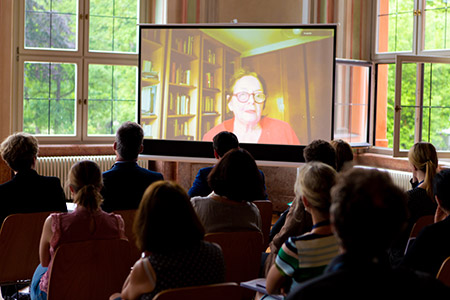
PROF. ELIZABETH LIRA KORNFELD, PhD, PSYCHOLOGIST, UNIVERSIDAD ALBERTO HURTADO, SANTIAGO DE CHILE
Elizabeth Lira focused her presentation on possible forms of reparation and compensation for the victims of the former Colonia Dignidad. Lira considers the conviction of the perpetrators to be of crucial importance for the victims. The crimes committed in the Colonia Dignidad against children and adults as well as the human rights violations were indeed established in several court cases. In addition, the Chilean state has recognized the victims of forced disappearances and torture. At the same time, it took a great effort to give visibility to the children and adults who have been victims of abuse of power and sexual violence. They all suffered extreme forms of dehumanization for different reasons. Lira particularly addressed the individual and collective psychological, medical, social and economic consequences of violence. Recognition of the victims’ suffering is reflected in the need to create frameworks for remembrance, for example through memorials and assurances that this will never happen again. There is still a need for action on these points.
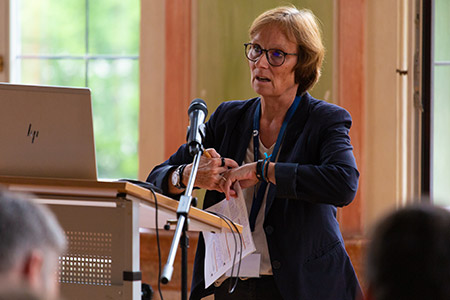
ELKE GRYGLEWSKI, PhD, MANAGING DIRECTOR OF THE FOUNDATION OF LOWER SAXONY MEMORIALS AND DIRECTOR OF THE BERGEN-BELSEN MEMORIAL, MEMBER OF THE BILATERAL EXPERT COMMISSION APPOINTED BY CHILE AND GERMANY FOR THE CREATION OF A DOCUMENTATION AND MEMORIAL CONCEPT FOR Colonia Dignidad
Elke Gryglewski pointed out the complexity of the term “victim” and the discourse within the victim groups of the Colonia Dignidad. In light of the heterogeneous political, cultural and social origins of the victims, there is a wide range of experiences suffered, which result in different narratives concerning the past. Lack of trust, racial prejudices, the absence of a solid information base and common communication structure exacerbate the subjectively perceived differences. The memory of the past, the perception of the present, the relationships between the victim groups, and finally the individual ideas of an “appropriate way to deal with the history of Colonia Dignidad” significantly influence the development processes of dealing with the past.
At the same time, however, the multiple perspectives in dealing with Colonia Dignidad also offer the opportunity for a joint initiative characterized by cultural tolerance and diversity. Within the framework of the expert commission, numerous meetings have already been organized since 2014 in the former Colonia Dignidad, today’s Villa Baviera. Gryglewski assessed the development of this initiative as very positive overall, and stated that she expected that in a few years a documentation center and a memorial would be built on the site of the former Colonia Dignidad on the basis of a joint concept.
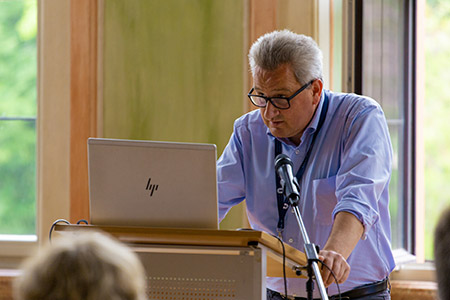
PROF. JENS-CHRISTIAN WAGNER, PhD, DIRECTOR OF THE BUCHENWALD AND MITTELBAU-DORA MEMORIALS FOUNDATION, MEMBER OF THE BILATERAL EXPERT COMMISSION APPOINTED BY CHILE AND GERMANY FOR THE CREATION OF A DOCUMENTATION AND MEMORIAL CONCEPT FOR COLONIA DIGNIDAD
Looking back on the difficult history of creating German memorials at Nazi crime scenes, Wagner emphasized the fundamental role of civilians in the establishment of memorials and places of learning. It was not until the early 1990s that the German state began to support the preservation of the historic sites in conjunction with an educational mission and the provision of a place of mourning and remembrance. The growing temporal distance from the historical events and the takeover of memorial sites from GDR administration after the German reunification led to the new state responsibility. Based on the experience with Nazi crime scenes, Wagner considers the creation of a memorial at the historic site to be a central goal in order to achieve a constructive social engagement with Colonia Dignidad. The newly designed site would have to meet various requirements: it would be a place of mourning and remembrance, an educational space and at the same time a crime scene in the context of legal evidence. For Wagner, like Gryglewski, the interaction with the extremely heterogeneous victim groups is one of the key challenges in the social engagement with Colonia Dignidad. He pointed out research desiderata concerning the collaboration of the German sect with the Pinochet dictatorship and the crimes committed against Chilean children, women and men, whose protests and public initiatives have made the crimes committed in Colonia Dignidad public in the first place.
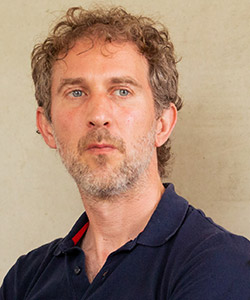
JAN STEHLE, PhD, POLITICAL SCIENTIST, FREIE UNIVERSITÄT BERLIN/CENTER FOR RESEARCH AND DOCUMENTATION CHILE-LATIN AMERICA, BERLIN
Jan Stehle’s presentation focused mainly on the contents of his recently published dissertation entitled “Der Fall Colonia Dignidad. Zum Umgang bundesdeutscher Außenpolitik und Justiz mit Menschenrechtsverletzungen 1961-2020″ (The case of Colonia Dignidad – on the dealing of Federal German foreign policy and judiciary with human rights violations 1961-2020). With regard to the crimes committed by/in Colonia Dignidad, Stehle distinguishes between internal – against members of the colony in order to maintain Schäfer’s authority – and external crimes– against persons and entities outside the colony – as well as primary – sexual crimes committed by Schäfer – and secondary crimes – committed by Colonia Dignidad as a system. According to Stehle, the group of victims can also be divided into subgroups: members of the colony, hundreds of political prisoners of the Chilean military dictatorship, peasants who previously owned the land of today’s Villa Baviera, and Chilean children from the surrounding area who were systematically brought to the colony and became victims of sexualized violence. Despite numerous crimes, only one perpetrator is currently in prison. Both Chile and Germany are dealing insufficiently or too slowly with these crimes, both juridically and politically.
Stehle criticized that a great number of files and evidence are still kept under lock and key, unavailable for academic research. Unless this changes, there will always be distortions of the truth – at the expense of the rights and needs of the victims.
PANEL II
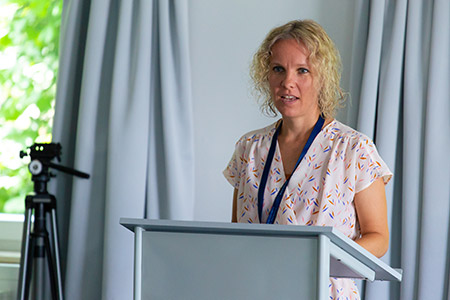
MIRIAM LAY-BRANDNER, PhD, DIRECTOR OF THE CENTER FOR LATIN-AMERICAN STUDIES (ZILAS), opened the second panel “The ‘Colonia Dignidad‘ in the media and its public perception in Germany and Chile”.
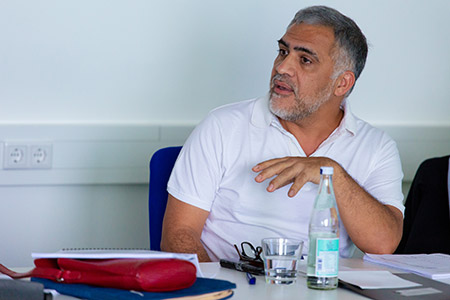
LUIS NARVÁEZ ALMENDRAS JJOURNALIST AND RESEARCHER, BUENOS AIRES
In his presentation, Luis Narváez emphasized the importance of journalistic work on the Colonia Dignidad case. He sees investigative journalism as an opportunity to both reconstruct historical contexts and present the results of research in a public setting. Narváez presented different data collections, with the largest and most informative coming from Colonia Dignidad itself: since 1974, index cards were created with information on three different groups. On the one hand, information was collected on potential “endangerers” of the colony, such as members of left-wing parties and groups; on the other hand, information was also collected on sympathizers and possible allies, i.e., members of right-wing parties, officers, etc., as well as evidence that could lead to blackmailing, such as sexual behavior, debts and fraud. Personal data, whereabouts and descriptions of specific situations, among other things, were gathered, as well as photographs. Although there are still source materials that have not yet been evaluated, previous research has been able to show which influential figures from Germany and Chile had collaborated with “Colonia Dignidad“, including the Chilean Secretary of the Interior at the time.
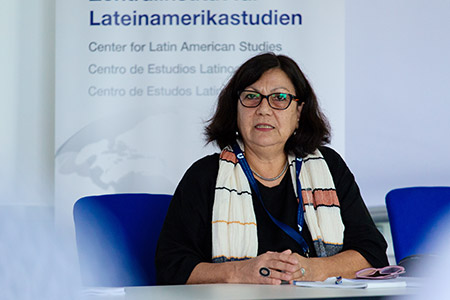
MARÍA LUISA ORTÍZ ROJAS HEAD OF COLLECTIONS AND RESEARCH, MUSEO DE LA MEMORIA Y DE LOS DERECHOS HUMANOS, SANTIAGO DE CHILE
Measures and initiatives against silence, as well as obstacles and barriers to remembering the crimes of the Chilean military dictatorship, were the focus of María Luisa Ortíz’s contribution. She presented material and immaterial sources that are testimonies to the atrocities committed during the military regime in Chile, and problematized that important evidence still disappears or is inaccessible. In particular, Ortíz highlighted the work of human rights organizations, civil society initiatives, memorials and documentation centers as milestones against forgetting in the last twenty years. With regard to the former Colonia Dignidad, she sees two challenges: on the one hand, the need for an inventory of all holdings, initiatives and cultural productions in order to make them more visible and to facilitate access to important testimonies. On the other hand, Ortíz sees the need for greater integration of human rights archives and collections related to Colonia Dignidad into educational curricula. Furthermore, Ortíz recognizes a desideratum in historical science regarding the system and structure of the organization and the differentiation between the former Colonia Dignidad and the current Villa Baviera. A carefully considered placement of the archives and source materials in the public space could ultimately make a central contribution to the promotion of democracy.
PANEL III
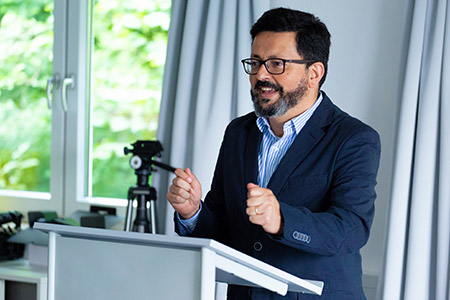
ANDRÉS JIMÉNEZ ÁNGEL, PhD, opened the panel “Ambivalent interrelations and entanglement ambiguity between Germany and Chile during the Cold War”.
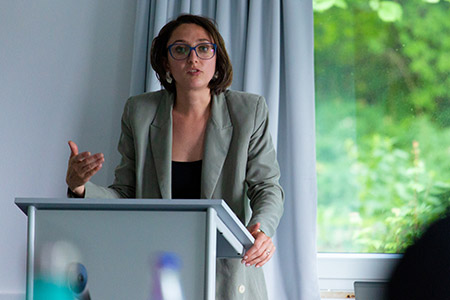
YVONNE BLOMANN HISTORIAN, UNIVERSITY OF BONN
n her lecture “Bonn in der Welt: the foreign relations of the Federal Republic of Germany during the Cold War. An overview”, Yvonne Blomann contributed the global political context for German foreign policy during the existence of Colonia Dignidad in Chile. She explained how the respective governments in Bonn reacted to the changing international power constellation after 1945 and how they interpreted and used foreign policy options. Initially, the West German governments attempted to respond to the lack of state sovereignty over security and foreign policy by integrating into Western alliances and orienting themselves toward U.S. foreign policy. In the wake of the détente between the Western and Eastern blocs and a phased weakening of the U.S. political leadership role, the Federal Republic’s ties to the United States began to loosen in the 1970s and 1980s. In its new position as a “middle power”, the Federal Republic developed a growing self-confidence with an independent multilateral foreign policy whose primacy lay in strengthening its economic relations.
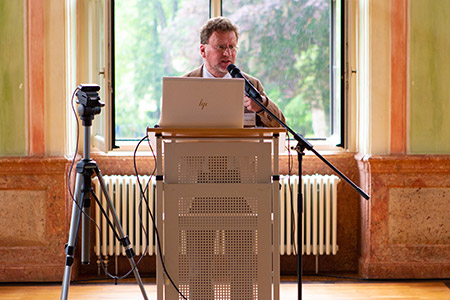
PROF. HOLGER M. MEDING, PhD, HISTORIAN, UNIVERSITY OF COLOGNE
In his remarks, Meding focused on the economic, but above all the political relations between Chile and the Federal Republic of Germany (FRG). In close coordination with the United States, the FRG initially became one of Chile’s most important trading partners after 1945 within the framework of bilateral initiatives and the main recipient of German development aid. German political foundations attempted to influence domestic political developments in Chile. The Konrad Adenauer Foundation and the Hanns Seidel Foundation were among the political actors in Chile that supported conservative parties and groups. Both organizations sympathized with the Chilean dictatorship after the 1973 coup and had contacts in the Colonia Dignidad. The West German government, on the other hand, officially distanced itself from the dictatorship in a measured way while signaling through so-called “quiet diplomacy” that the human rights violations committed by the dictatorship would not result in any serious sanctions. The Chilean and German intelligence services were particularly active in the respective country of the other, both before and after the coup. Two special intelligence operations – “Rubicon” and “Minerva” – provided the Bundesnachrichtendienst (BND) and the U.S. Central Intelligence Agency with information about the intentions and activities of Latin American military dictatorships. Meding quoted the BND, according to which Colonia Dignidad played only a subordinate role in the records of “Operation Rubicon”, however.

HOLLE MEDING HISTORIAN, FREIE UNIVERSITÄT BERLIN
In her lecture, Holle Meding traced the beginnings of the Private Sociale Mission founded by lay preacher Paul Schäfer in Siegburg in 1956; from Schäfer’s early youth work to the founding of the community and later emigration to Chile. This background of Colonia Dignidad reconstructed by Meding is based on numerous source researches in regional archives, local newspaper reports and some interviews with contemporary witnesses. She comes to the conclusion that Schäfer did not constitute the absolute religious focal point of the group during this time, but that Hugo Baar, who brought in the Gronau branch, also had an important leadership role. Meding also traced the hesitant actions of the local supervisory authorities, who were well aware of the dark side of the Private Sociale Mission, such as sectarianism, isolation and fundamentalist religious rules. Overall, however, the youth center of the Private Sociale Mission, which looked after children and young people from poor or unstable family backgrounds, was seen as an asset for the region. If violations of existing regulations were found, there was assistance to remedy them. When the Siegburg District Court finally issued a warrant for Schäfer’s arrest for sexual abuse of minors in February 1961, he was already in Chile. The association’s management, which remained in Siegburg, lied to the authorities and frustrated the prosecution through deception and concealment. Neither the criminal police nor the district youth welfare office investigated the potential abuse cases in the youth center very thoroughly. The Siegburg association remained active for decades, supporting Colonia Dignidad in Chile.
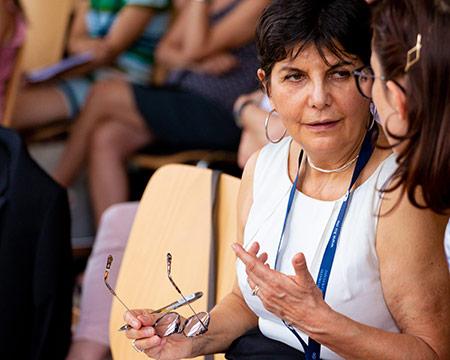
ISABEL TORRES DUJISIN, PhD, HISTORIAN, UNIVERSIDAD DE CHILE, SANTIAGO DE CHILE
Contemporary historian Isabel Torres devoted her lecture to the years between 1961, the founding year of Colonia Dignidad, and 1973, the year of the military coup in Chile. She was interested in the connections between the German settler community and the Chilean right. Torres proposed that the foundations for future support networks and political-economic connections were laid during this period. Although the 1960s saw the formation of the political connections to right-wing and ultra-right sectors that were later consolidated between the leadership of Colonia Dignidad and the dictatorship’s security apparatus, research on this period is still sparse. With references to Hannah Arendt and Henry Rousso’s concept of the Vichy Syndrome, Torres explored the question of how a settlement like the Colonia Dignidad could have been possible and lasting for decades. The fear of communism that had already moved some settlers of Colonia Dignidad in postwar Europe to join Paul Schäfer also fueled fear of Salvador Allende and his party, the Unidad Popular, in the 1960s and early 1970s.

THOMAS KRÜGER PRESIDENT OF THE FEDERAL AGENCY FOR CIVIC EDUCATION (BPB), BONN
Krüger approached the topic of Colonia Dignidad from the perspective of two different approaches, whose goals may seem more urgent depending on the temporal distance to the historical events: “coming to terms with the past” and “political-historical education”. Coming to terms with the past is primarily about naming injustice and those responsible for it as well as getting justice for the victims and those affected. It emphasizes the relevance of the past for the present, but on the basis of premises that tend not to be problematized in their contemporary relevance and are motivated by historical politics. Political-historical education is particularly interested in the “gray” in a historical situation and analyzes, for example, the seductive power of dictatorships in order to recognize developments in the present. Non-partisanship is crucial in order to resist instrumentalization in the politics of memory. In this sense, a decisive criterion of political-historical education is the question of ambiguity and a democratic approach to the past. With a quote from Chantal Mouffe: “Consensus is the end of politics”, Krüger linked the demand to actively seek multiperspectivity – for example through questions from the field of gender studies, which can define new victim groups of Colonia Dignidad. He emphasized that dealing productively with conflicts arising from multiperspectivity serves to strengthen social cohesion.
PANEL IV
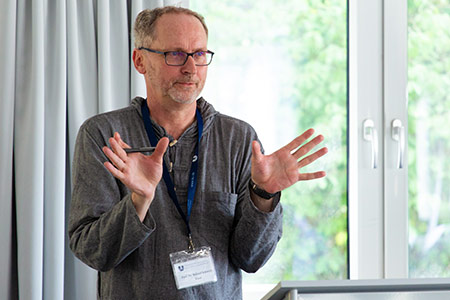
ROLAND SCHMIDT-RIESE, PhD, opened Panel IV, “The ‘Colonia Dignidad‘ during the Chilean dictatorship and its role within the system of state oppression”
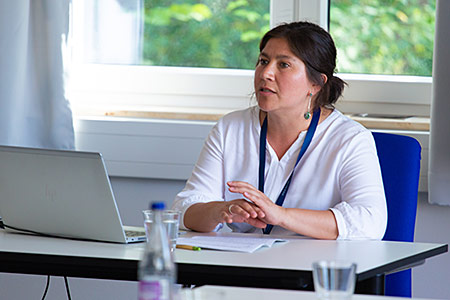
EVELYN HEVIA JORDÁN PSYCHOLOGIST, FREIE UNIVERSITÄT BERLIN
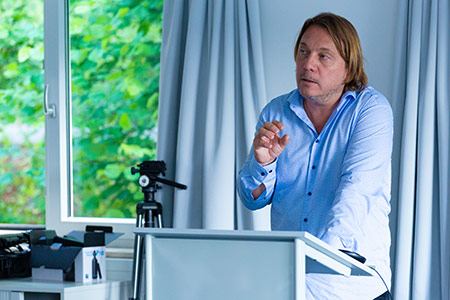
CHRISTIAN BERGMANN JOURNALIST AND RESEARCHER, LEIPZIG
In his lecture, journalist Christian Bergmann asked about the economic interrelations of Colonia Dignidad. From an actor-centered perspective, he focused particularly on the roles of Erich Strätling and Gerhard Mertins. Strätling had been the Federal Republic’s ambassador to Chile in the 1970s and maintained close contacts with the Colonia leadership. Gerhard Mertins, probably the best-known arms exporter of the FRG, had strengthened these contacts to the Colonia Dignidad, especially on the economic level. On the other hand, Norbert Blüm, belonging to the “left wing” of the CDU, had repeatedly drawn attention to the human rights violations within the Colonia Dignidad and earned harsh criticism for this, especially from CSU politician Strauß, who repeatedly found words of praise for the settler community. Bergmann’s contribution illustrated one thing in particular: that the importance of contemporary witness interviews is particularly crucial where documents from archives continue to be kept under lock and key or where evidence has already been destroyed or has disappeared. Nevertheless, caution is called for when statements by contemporary witnesses are difficult to confirm or complement through the analysis of textual sources. In addition, many contemporary witnesses who were in contact with Colonia Dignidad as adults have already passed away.
PANEL V AND VI
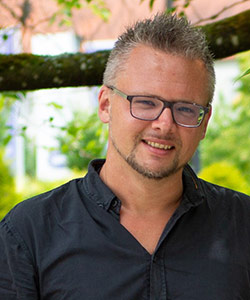
The introduction to Panel V “Dealing with experiences of physical and psychological forms of violence since the second half of the 20th century in Latin America” and Panel VI “Transitional justice as an international and bilateral challenge” was given by JOCHEN KLEINSCHMIDT, PhD.
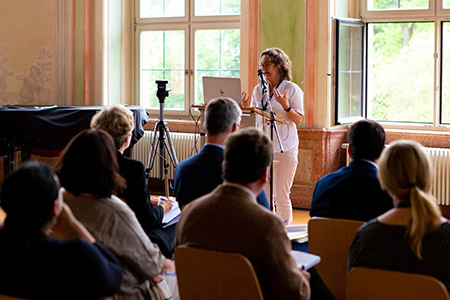
PROF. SABINE KURTENBACH, PhD, POLITICAL SCIENTIST, GIGA HAMBURG/UNIVERSITY OF MARBURG
Sabine Kurtenbach’s lecture focused on the long-term consequences of violence as a complex phenomenon that is being researched by different disciplines today. For the Latin American context, the political scientist distinguished between different contexts of violence, such as in authoritarian regimes and dictatorships, or wars and armed conflicts, as well as violence by organized crime. In a broader perspective, the experience of Colonia Dignidad could be analyzed as a particular form of parallel state beyond state control, according to Kurtenbach. During the dictatorship, the Colonia cooperated with the Chilean state and participated in the repression of oppositionists. Afterwards, it resisted state interference. Human rights violations and violence in the Colonia Dignidad were related to the torture of opponents of the regime, the sexual abuse of children or forced labor. These crimes came to an end with the arrest of Paul Schäfer, but most of them still remain unpunished. While the case of Colonia Dignidad may certainly be rated as a special case in peace and conflict research, there are other experiences with German human rights violations in Latin America. Kurtenbach’s contribution ended with an outlook on current examples of German cooperation with repressive regimes, for example in the People’s Republic of China.
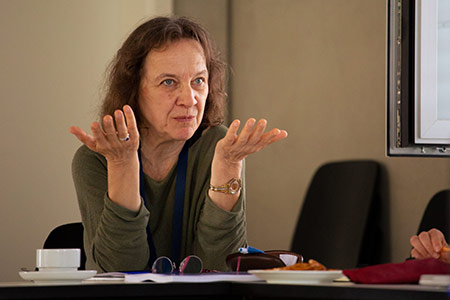
SUSANNE BAUER, PhD, PSYCHOLOGIST AND MUSIC THERAPIST, UNIVERSITY OF THE ARTS, BERLIN
In the Colonia Dignidad children and adolescents were systematically humiliated, punished, psychologically and physically abused and sexually abused for decades. Previously existing family structures were dissolved; children, regardless of age, were separated from their mothers, fathers and siblings and raised under the supervision of so-called group aunts. Growing up and the entire childhood were characterized by fear, emotional isolation, mistrust and experience of irrational violence. The psychosexual development must be classified as particularly serious. Both girls and boys experienced sexualized violence of various kinds from the age of seven at the latest. All this prevented a healthy individual personality development. According to Susanne Bauer, findings from developmental psychology, psychoanalytic trauma psychology and systemic theory can help to form a more adequate picture of the extent of the psychological damage inflicted. Based on her own findings, Bauer summarized that most of the now adult residents of Colonia Dignidad were both physically and mentally ill. In addition to personality traits such as dependency structures in relationships and a lack of mentalization, there was evidence of a distorted perception of reality, self and others as well as symptoms of post-traumatic stress disorder (PTSD). Many of them suffered from anxiety disorders, panic attacks, low self-esteem or narcissistic self-aggrandizement. Both the German children transferred from Germany to Chile and those born in Colonia Dignidad and the Chilean children adopted by the Colonos were affected by the abuse and its serious consequences on personality development.
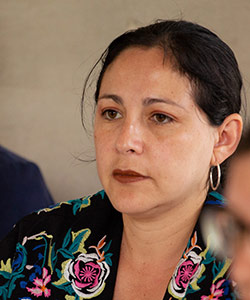
LORENA ALBORNOZ GARRIDO LAWYER AND SOCIAL ANTHROPOLOGIST, UNIVERSITY OF BIELEFELD
Lorena Albornoz’s contribution was about questions and possibilities of reparations for the victims of the crimes in the Colonia Dignidad. The uncertainty about the whereabouts of missing persons who were taken to the Colonia during the military dictatorship and then disappeared without a trace was also a topic of Albornoz’s presentation. She emphasized above all the initiatives of civil society actors and many relatives of the victims, who demanded, and still demand, further measures in order to solve these cases swiftly. Albornoz herself advocates for the establishment of a truth commission, whose main task would have to be to clarify the whereabouts of the still missing persons. According to Albornoz, all the measures developed so far by the Chilean state regarding truth, justice and reparation for the victims of the dictatorship have been the result of the tireless campaign of the relatives. However, in the particular case of Colonia Dignidad two states were responsible for the atrocities – the solving of and dealing with the crimes can therefore only result from binational cooperation between Chile and Germany.
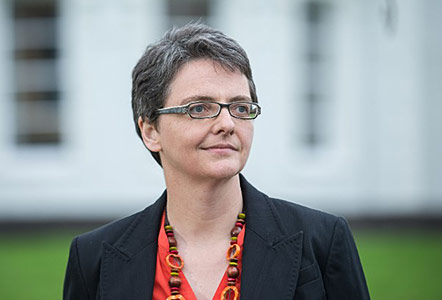
CATH COLLINS, PhD, INSTITUTE OF TRANSITIONAL JUSTICE, ULSTER UNIVERSITY, NORTHERN IRELAND/ DIRECTOR OF THE OBSERVATORIO JUSTICIA TRANSNACIONAL, UNIVERSITY OF DIEGO PORTALES, SANTIAGO DE CHILE
The aim of transitional justice is to facilitate a constitutional, pacifying and democratic approach to past state and conflict violence. On the basis of this concept, six key sets of issues arise in connection with Colonia Dignidad in Cath Collins’ view. Firstly, these include questions of decolonization with regard to the expropriated Chilean land on which the Colonia Dignidad was built; secondly, the financial damage inflicted on the victims through forced labor and fraud must be defined; thirdly, the problematic hierarchization and categorization of victims and perpetrators must be resolved; and fourthly, the particular intergenerational structure of the crimes committed in the Colonia Dignidad, which affected both adults and children, and associated with it the collaboration with the Pinochet regime and international right-wing extremist networks must be investigated. A fifth field of investigation lies in the media processing of the Colonia Dignidad and the dissemination of manipulative and partly falsifying interpretations. Collins devoted one aspect to the field of new forensic and digital technologies and the discovery of archival material in recent years. Although new sources are opening up here, Collins fears that if written source material – especially if it comes from the hands of the perpetrators – is valued more highly in investigative proceedings than prior statements by victims and contemporary witnesses, the result may be a devaluation and rewriting of oral history findings in favor of legally determined information.
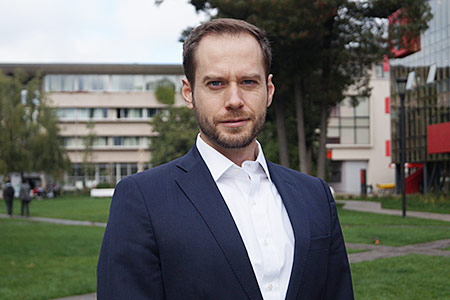
FRANCISCO BEDECARRATZ SCHOLZ, PhD, DEPARTMENT OF LAW, UNIVERSIDAD AUTÓNOMA DE CHILE, SANTIAGO DE CHILE
Bedecarratz Scholz enlarged upon and expanded on Andreas Schüller’s presentation on the prosecution of Hartmut Hopp by directing his focus to the legal cooperation between Chile and Germany and the importance of the proceedings for transitional justice in Chile. The Hopp case is one of a number of cases in which German-Chilean cooperation in the prosecution of crimes against humanity failed. Both countries granted refuge to people responsible for serious human rights violations in Germany and in Chile and for whom extradition requests existed, and protected them from prosecution. Favorable political conditions for the persons concerned have made this possible, but also the differences in Chilean and German criminal sentencing, as can be seen especially from the example of Hopp. While Hopp was convicted in Chile for aiding and abetting in cases of rape and sexual abuse on the basis of systemic responsibility, without it being possible to prove that he had been directly involved in the crimes, this lack of proof was the reason for German courts to discontinue the proceedings in Germany. Thereby, the Chilean verdict on Hartmut Hopp was declared invalid in Germany. The failure to convict a German who committed human rights violations on Chilean territory meant a serious defeat for Chilean transitional justice and put a strain on German-Chilean relations. Bedecarratz Scholz nevertheless considers the Chilean investigations to be positive for the purpose of coming to terms with the past and efforts to make amends, as they made a significant contribution to solving the crimes that took place in the Colonia Dignidad.
CONCLUSION
The 5th Symposium of the Elisabeth Käsemann Foundation, which was organized together with the Center for Latin American Studies (ZILAS) at the Catholic University of Eichstätt-Ingolstadt, offered the participating experts a broad interdisciplinary approach to the topic of Colonia Dignidad. As a result of the multi-perspective approach, numerous insights emerged that could be discussed in the plenum, but also new questions and desiderata. For example, it became apparent that it has not yet been reconstructed which networks enabled the organization to protect itself from external intervention and to establish an economically successful system over a very long period of time. The background of the Colonia Dignidad in Germany is also still partly obscure. Moreover, the enormous complexity of the crimes and the political and social spheres in Germany and Chile that affected them became clear. In this context, some participants questioned whether the assignment of Colonia Dignidad to the research field of sects or religious communities was effective, considering the aforementioned complexity. The importance of the still inadequate prosecution of the crimes was also emphasized several times. In connection with this, an intensified dialog with representatives of the judiciary within the framework of scientific formats was suggested.
In the final discussion, moderated by Christiane Hoth from Catholic University of Eichstätt-Ingolstadt, and Dorothee Weitbrecht, PhD, from the Elisabeth Käsemann Foundation, participants emphatically demanded free access to all documents held in the archives, such as those of the BND. There was a consensus that it is indeed the task of the sciences as a kind of “truth commission” to reconstruct and review past crimes. At the same time, however, the limitations of scientific work were discussed and the question was raised as to what opportunities artistic formats, for example, could offer in order to bring the topic of Colonia Dignidad more into focus in the public sphere. The creation of places of learning, new pedagogical concepts and freely accessible information forums were also formulated as key objectives in the final discussion. Many of the speakers were critical of the way in which the history of Colonia Dignidad was processed in various media formats, some of which conveyed one-sided or even false narratives.
The symposium was of particular importance not only with regard to the comprehensive contextualization of the topic of Colonia Dignidad but also with regard to the attempt to embed it in global history. Alongside renowned experts, junior scientists were able to make valuable contributions to the discussion, providing new impulses for further research.
It remains to be said that there is neither a lack of sources on the complex topic of Colonia Dignidad nor a lack of will to make them accessible for research. The increased need for international research projects was also welcomed by all participants. The 5th Symposium of the Elisabeth Käsemann Foundation created an important basis for a continuous dialog between different experts, research approaches and perspectives in the research field of the Colonia Dignidad.
Organisation:
Prof. Thomas Fischer (PhD)
Dorothee Weitbrecht (PhD)
Christiane Hoth de Olano
Report:
Dorothee Weitbrecht (PhD)
Christiane Hoth de Olano
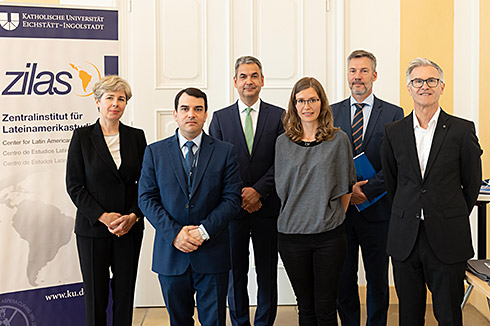
From left to right:
Dorothee Weitbrecht managing director of the Elisabeth Käsemann Foundation, Sebastian Lemp Secretary of the Embassy of Chile in Germany Klaus Stüwe Vice President of the Catholic University of Eichstätt-Ingolstadt, Christiane Hoth Co-Organization of the symposium, Center for Latin American Studies (ZILAS), Enrico Brandt German Federal Foreign Office, Head of Division for Regional Policy Affairs for Latin America and the Caribbean & Bilateral Relations with Cono Sur countries and Brazil, Thomas Fischer Director of the Center for Latin American Studies (ZILAS) and Chairman of the Board of Trustees of the Elisabeth Käsemann Foundation.
